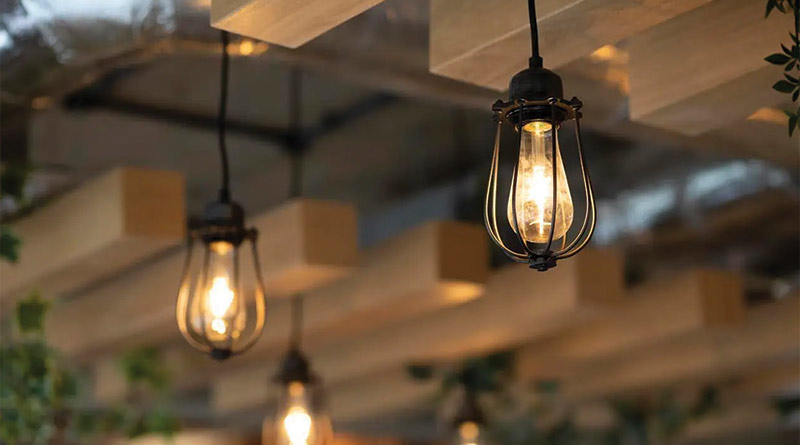By Mara Rypacek Miller, Managing Director, Industville Ltd (www.industville.co.uk)
Choosing the right commercial lighting can be essential for the success of your business, whether it’s a café, hotel, pub or restaurant.
Not only will the correct lights help boost the mood, atmosphere and aesthetics of your premises, but investing in the right fixtures can also help you reduce energy costs. Keeping costs down is becoming an increasingly pressing priority for all of us – reviewing your business’s lighting arrangements is a simple, efficient place to start.
The Importance of Choosing the Right Commercial Lighting
Lighting plays such an important role in all kinds of interiors, helping hotel interiors become welcoming places for guests, creating inviting restaurant spaces where customers are more likely to return or adding to the cosy ambience of pubs.
Consider the needs of your business and whether the current lighting solutions are best for the job. If saving energy is your goal, you’ll want versatile fixtures that optimise energy output and brighten the relevant space sufficiently.
1. Opt for Energy-Saving LED Bulbs
Reviewing your current light bulbs and replacing them if necessary is often the best place to start when looking to cut down on lighting costs.
Many businesses will have already moved away from using halogen or incandescent bulbs in favour of energy-saving LEDs – if you haven’t yet, this is a must. LED bulbs are far more efficient than traditional bulbs, offering the same levels of illumination for a fraction of the energy usage.
This can go a long way in reducing running costs. Additionally, LED bulbs are longer-lasting than other bulbs meaning your establishment will also save money in maintenance costs in the long run.
These days LEDs are incredibly diverse, coming in a range of styles and sizes. Edison-style LED light bulbs, for instance, provide the attractive look of classic vintage bulbs with all the benefits of modern energy-saving technology.
2. Turn Off Lights When Not in Use
Another simple place to start is encouraging a company culture that prioritises an energy-saving mindset. Remind employees to turn off lights when they’re not in use and generally be more mindful of how many lights need to be on and when.
It is often worth incorporating lights with motion sensors into a space as this’ll ensure they’re only on when a room is in use.
If you’re not using lights with sensors, stay conscious of empty meeting rooms, stock rooms and even bathrooms – if the space is not in use, do the lights always need to be on?
3. Use Dimmer Switches Where Appropriate
Not every space in your business needs to be illuminated to full brightness at all times. In fact, slightly lower light levels can create a more pleasant, intimate atmosphere that’s great for a cafe or restaurant and will be less harsh on the eyes.
Using a dimmer switch with your lighting means you have great control over the general mood and brilliance provided by your lights. Doing this can also provide opportunities to reduce energy usage.
When you use a dimmer switch to dim a light, less electricity is sent to the bulb, reducing costs over time. If you use a dimmer more often than not, you can also extend your bulbs’ lifespan, as they won’t have to use or process as much power.
4. Consider Lighting Placement in Your Business
It is a good idea to review your current lighting placement and general setup to remove any inefficiencies here. You may not actually need as many lights as you have, leading to energy waste, especially if they are controlled by the same switch.
Consider whether the lighting layout could be reconfigured to remove redundant lights and optimise the lights that remain.
This will also include making sure you hang any pendants at the right height and place wall lights at a suitable distance apart, using them to shine light where it’s most needed.
5. Make the Most of Natural Light
Don’t hide windows away behind obstructive blinds or too much clutter. Maximising possibilities for natural light helps reduce the need to turn lights on during the day and can give interiors a more open, welcoming feeling.
Additionally, increased natural light can help boost people’s mood, making it especially important for those working in the hospitality industry which often involves long unsociable hours. Embracing features designed to promote employee well-being has become a big trend that is set to continue.


